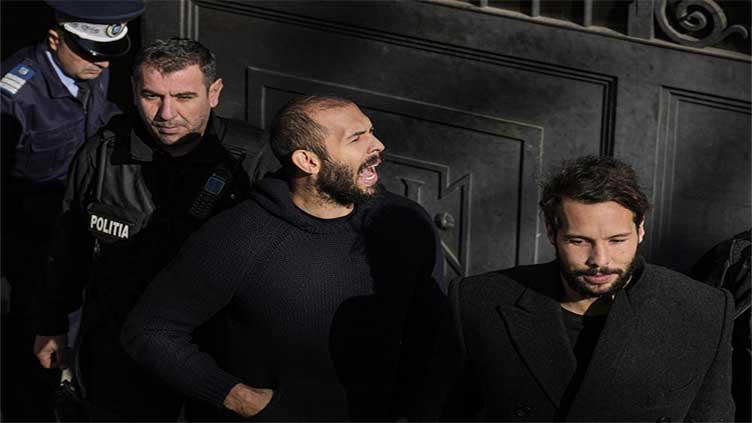Romanian court rules to hold Andrew Tate for 30 more days

World
Romanian court rules to hold Andrew Tate for 30 more days
BUCHAREST, Romania (AP) — A court in Romania’s capital agreed Tuesday to extend social media influencer Andrew Tate’s detention on suspicion of organized crime and human trafficking by another 30 days, an official said.
Tate, 36, a British-U.S. citizen known for misogynistic views who has 5.1 million Twitter followers, was arrested on Dec. 29 when authorities descended on his property north of Bucharest. His brother, Tristan, and two Romanian women also are in custody in the same case. None of the four has been formally charged.
Ramona Bolla, a spokesperson for Romania’s anti-organized crime agency, DIICOT, told The Associated Press that the Bucharest Tribunal approved prosecutors’ request to hold the Tates for another 30 days, while the two women will be put under house arrest.
It was the third 30-day extension granted since the Tates were arrested. The brothers also lost an appeal on Feb. 1 of a judge’s Jan. 20 decision to keep them behind bars while investigations continued.
A document explaining that earlier decision said the judge took into account the “particular dangerousness of the defendants” and their capacity to identify victims “with an increased vulnerability, in search of better life opportunities.”
Eugen Vidineac, one of the lawyers representing the Tate brothers, told journalists before Tuesday’s ruling that the defence team would challenge another extension if one were issued. He insisted the defence had “effectively paralyzed the evidence” in the case so far and that there was enough to keep the Tates in custody.
Tate, who has reportedly lived in Romania since 2017, was previously banned from various social media platforms for expressing misogynistic views and hate speech. He has repeatedly claimed Romanian prosecutors have no evidence and alleged their case is a “political” attack designed to silence him.
A post on Andrew Tate’s Twitter account before Tuesday’s decision expressed confidence in his lawyers and his eventual release. A subsequent tweet said, “I can easily think myself into euphoric gratefulness for things as simple as having air to breathe. I can easily think myself into the deepest and darkest depression. I’ve seen hell. I’ve lived in hell. I can produce either state.”
Romania’s anti-organized crime agency said in a statement after the December arrests that it had identified six victims in the human trafficking case who were subjected to “acts of physical violence and mental coercion” and were sexually exploited by members of the alleged crime group.
The agency said victims were lured with pretences of love and later intimidated, placed under surveillance and subjected to other control tactics while being coerced into engaging in pornographic acts for the financial gain of the crime group.
In January, Romanian authorities descended on a compound near Bucharest linked with the Tate brothers and towed away a fleet of luxury cars that included a Rolls-Royce, a Ferrari and a Porsche. They reported seizing assets worth an estimated $3.9 million.
Prosecutors have said that if they can prove the cars’ owners gained money through illicit activities such as human trafficking, the assets would be used to cover the expenses of the investigation and to compensate victims. Tate also unsuccessfully appealed the asset seizure.

